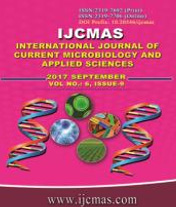


 National Academy of Agricultural Sciences (NAAS)
National Academy of Agricultural Sciences (NAAS)

|
PRINT ISSN : 2319-7692
Online ISSN : 2319-7706 Issues : 12 per year Publisher : Excellent Publishers Email : editorijcmas@gmail.com / submit@ijcmas.com Editor-in-chief: Dr.M.Prakash Index Copernicus ICV 2018: 95.39 NAAS RATING 2020: 5.38 |
Beta-lactam antibiotics are the most commonly used antimicrobials against bacterial infections. In recent years, emergence of resistance to these antimicrobial agents due to production of β-lactamases has become a serious global health concern. It was reported as leading cause to ineffectiveness to antibiotic usage, increased morbidity and high cost of treatment. Extended spectrum beta-lactamases (ESBLs) detection amongst the Gram –negative bacilli is considered as an important marker of endemicity. Knowledge of the patterns of antimicrobial resistance and effective surveillance has significant implications for patient management and guiding clinicians to take appropriate interventions. A prospective study was conducted over a duration of 1 year (March 2014 to February 2015) in the Department of Microbiology, of a teaching tertiary care hospital. The prevalence of potential ESBLs producers was explored. Antimicrobial susceptibility was determined by the Kirby-Bauer disc diffusion method according to Clinical Laboratory Standard Institute (CLSI) guidelines. A total of 250 samples from male and female patients visiting the outpatient department (OPD) and inpatient department (IPD) of our hospital were collected. Among the ESBL producers maximum number of isolates were identified as E. coli 45(44.1%) followed by Klebsiella spp. 30(29.4%), Citrobacter spp. 10(9.8%) Proteus spp. 12(11.7%), and Enterobacter spp. 5(4.9%) respectively. ESBLs producing isolates were found to be multi-drug resistant when compared to non-ESBL producers. High prevalence of ESBLs producing Enterobacteriaceae in hospitals, with a tendency for multi-drug resistance, suggests that routine detection is mandatory as this may help in regulating hospital antibiotic policy.
 |
 |
 |
 |
 |